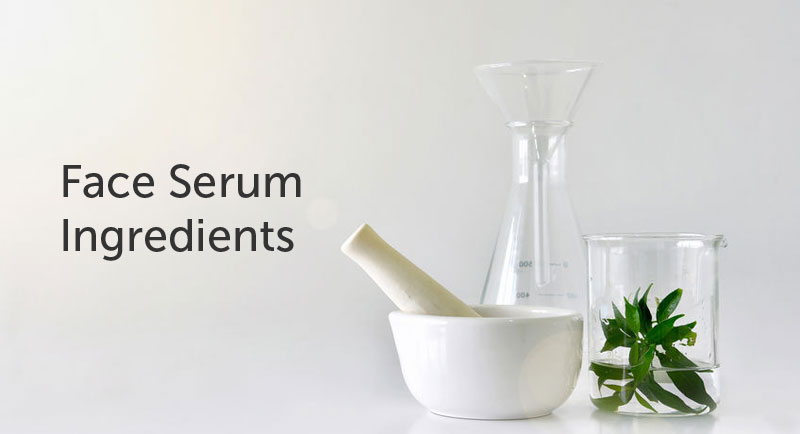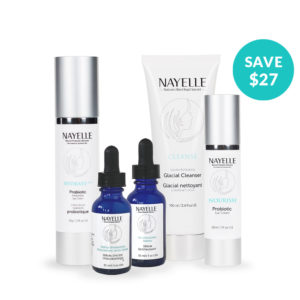Best Face Serum Ingredients

A face serum always begins its life as either a water base or oil base product. Concentrated ingredients such as natural extracts, peptides, Alpha Hydroxy Acids (AHA’s), Beta Hydroxy Acids (BHA’s), ceramides, retinoids, lipids, vitamins, acids and high tech synthetic creations are added to provide a variety of skin enhancing properties.
Water based serums
For water based face serums, water or aloe is used as the base of the serum and concentrated ingredients are added to that to create the serum. Water based serums are popular because water soluble ingredients such as hyaluronic acid and vitamin C can be more easily absorbed into your skin. For water based face serums we would recommend looking aloe as the preferred first ingredient as it provides better skin hydration than water alone.
Oil based serums
For oil based serums are simply serums that begin with an oil as there base. The oil bases used most often are argan, jojoba and avocado oil. Oil based face serums are better suited to stay on the top layers of your skin to protect against pollution, dry environments and the sun’s rays. For dry skin conditions we recommend the use of an oil based serum.
Let’s look at the most common oils used to create oil based serums:
- Argan Oil – Argan oil has a comedogenic rating of zero and is good for sensitive skin. It can help reduce inflammatory skin conditions, excessive sebum (oil) production and acne breakouts.
- Avocado Oil – Avocado oil is a popular and effective oil used in serums for many reasons. Avocado oil has numerous properties that can help benefit your skin including a rich fusion of bioactive molecules such as vitamin C, vitamin E, folate and fatty acids.
- Jojoba Oil – Jojoba oil is derived from the nut of the jojoba plant. Jojoba oil is gentle enough to be used as a carrier oil to mix with other essential oils and other face serum ingredients. Pure jojoba oil has been a clinically proven to help dry skin conditions and acne.
The Most Effective Face Serum Ingredients
Most face serums will combine several ingredients to make the serum as effective as possible at achieving the desired result, whether that be hydrating, exfoliating, acne fighting, anti-inflammatory or reducing the signs of aging like fine lines and wrinkles.
Let’s examine the most popular and effective face serum ingredients:
Hyaluronic Acid in Face Serum
Hyaluronic acid (HA) is a serum ingredient that everybody is talking about. Hyaluronic acid is naturally present in your skin and 50% of your bodies total HA is found in your skin. There are many scientific studies that show hyaluronic acid to be one of the most effective skin hydrators because of its ability to bind with water and hold up to 1000 times its own weight in water. These hydrating properties make hyaluronic acid a desired ingredient in many serums.
The Hyaluronic acid in your skin diminishes over time as we age. Adding Hyaluronic acid to the skin in the form of a topical application helps to keep skin moisturized but it should be combined with other ingredients to achieve a total skin moisturizing package.
Natural Extracts in Face Serum
Many serums incorporate natural extracts in their ingredients. The idea behind “extracts” is to draw out the most effective and beneficial components of the original source material in a concentrated form. Some of the most popular natural extracts are derived from: green tea, grapeseed, rosemary, aloe vera and acai berries to name a few.
Vitamin C in Face Serum
Vitamin C is a useful serum ingredient because it can be absorbed into the skin through topical application. Vitamin C is an effective antioxidant and has anti-inflammatory properties. It does occur naturally in the skin and is a critical factor for collagen synthesis and elastin production. Vitamin C is known to protect skin against UV damage and is needed in the skin for wound healing.
It is important to note that Vitamin C can also be listed as L-ascorbic acid, Magnesium Ascorbyl Phosphate, or Sodium Ascorbyl Phosphate in the ingredients.
Vitamin E in Face Serum
Vitamin E is a popular face serum ingredient because it is a well-known acne fighter. Its chemical composition is made up of four tycopherol proteins and four tocotreinol proteins, both fat-soluble compounds. These proteins are a rich source of anti-oxidants that help skin fight back against the damage caused by free radicals. Reducing the damage of free radicals helps your skin fight inflammatory conditions like acne.
Vitamin E also helps your skin produce collagen and elastin which in turn help to strengthen your skin. Healthy strong skin is the best foundation to achieve better skin hydration.
Retinol in Face Serum
Retinol is just one of many related compounds called retinoids that are derived from vitamin A. Retinol is a common and popular serum ingredient because it stimulates the production of new skin cells. Retinol also helps boost the production of collagen. Retinol helps reduce the appearance of fine lines and wrinkles.
Ceramides in Face Serum
Your skin is naturally comprised of over 50% Ceramides. Ceramides are a family of lipid (fat) molecules comprising of sphingosine and a fatty acid. Ceramides are found in high concentration in the upper layers of the skin. Generally, you will see the word ceramide on the ingredients label as: Ceramide AP, EOP, NG, NP, or NS.
Alpha Hydroxy Acids (AHA’s) in Face Serums
Citric acid and malic acid are both effective AHA’s. They are water soluble acids. These acids work by stripping away the top layers of skin giving way for new layers of skin to develop. AHA’s are popular serum ingredients for those looking for skin hydration and ant-aging benefits.
Beta Hydroxy Acids (BHA’s) in Face Serum
BHA’s are oil soluble acids and there small molecular size allows them to penetrate deep into the skin to help remove dead skin cells and cleanse the skin of excess sebum. BHA’s are better designed for fighting acne, while AHA’s are better suited for skin hydration.
Salicylic acid is one of the most popular BHA’s found in face serums. It helps to kill the bacteria that causes acne.
Peptides in Face Serum
Peptides are the building blocks required to make protein. Peptides are sometimes referred to as “the fragments of proteins.” They are made up of chains of amino acids.
When peptides are applied topically to the skin they send signals for the production of new skin. The molecules that make up peptides are small enough to penetrate deep into the skin.
Matrixyl is one of the most well-known peptides prized for its collagen stimulating properties.
Synthetic Ingredients in Face Serum
The term “synthetic” is not always a bad thing. In fact with skincare synthetic blends can have some amazing properties and benefits for your skin.
Replexium is a synergistic blend of two peptides that can be delivered to the skin in a bio-available form with a small molecular weight. Studies have clearly demonstrated that Replexium can fight several types of wrinkles and can bring back firmness to your skin.

